语法知识—特殊句式的分类汇编及解析
初中语文特殊句式讲解
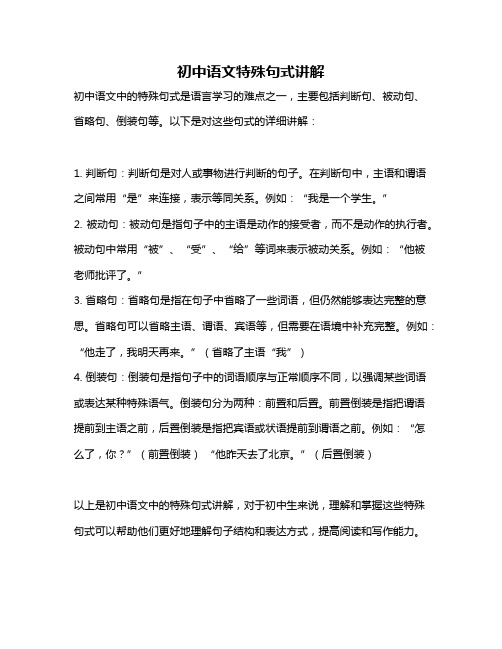
初中语文特殊句式讲解
初中语文中的特殊句式是语言学习的难点之一,主要包括判断句、被动句、省略句、倒装句等。
以下是对这些句式的详细讲解:
1. 判断句:判断句是对人或事物进行判断的句子。
在判断句中,主语和谓语之间常用“是”来连接,表示等同关系。
例如:“我是一个学生。
”
2. 被动句:被动句是指句子中的主语是动作的接受者,而不是动作的执行者。
被动句中常用“被”、“受”、“给”等词来表示被动关系。
例如:“他被老师批评了。
”
3. 省略句:省略句是指在句子中省略了一些词语,但仍然能够表达完整的意思。
省略句可以省略主语、谓语、宾语等,但需要在语境中补充完整。
例如:“他走了,我明天再来。
”(省略了主语“我”)
4. 倒装句:倒装句是指句子中的词语顺序与正常顺序不同,以强调某些词语或表达某种特殊语气。
倒装句分为两种:前置和后置。
前置倒装是指把谓语提前到主语之前,后置倒装是指把宾语或状语提前到谓语之前。
例如:“怎么了,你?”(前置倒装)“他昨天去了北京。
”(后置倒装)
以上是初中语文中的特殊句式讲解,对于初中生来说,理解和掌握这些特殊句式可以帮助他们更好地理解句子结构和表达方式,提高阅读和写作能力。
语法知识—特殊句式的分类汇编含解析

语法知识—特殊句式的分类汇编含解析一、选择题1.—Did Jimmy win first prize in the swimming competition yesterday?—Yes, of course. , he’s the best swimmer in out city.A.Without doubt B.For exampleC.At first D.Don’t worry2.I like green but my sister ______.A.like green,too B.doesn’t C.does D.doesn’t like3.—I didn’t go swimming yesterday afternoon.— . I had to clean up my bedroomA.So did I B.So I did C.Neither I did D.Neither did I4.—I’m not going swimming tomorrow afternoon.— ________. I have to clean up my bedroom.A.So am I B.Neither am I C.Neither I am D.So I am5.﹣Who found the lost sheep?﹣Tim and Tom______.A.finded it.B.were found C.did D.found6.Here ________ an email for you.A.is B.are C.has D.have7.—I’m sorry, sir. I can’t finish the work on time.— Never mind. ________, the work is quite difficult.A.At least B.For instanceC.After all D.First of all8.- David wants to work as an architect when he grows up.-______________.A.So am I B.Neither am I C.So do I D.Neither do I 9.We have seven lessons every day. MaryA.So has B.Neither has C.So does D.Neither does 10.—I haven’t seen the movie Hero Is Back—______________. Let’s go to see it together this Sunday.A.Me, too. B.Me neither. C.Yes, please. 11.Keeping pets brings us happiness. ________, we can also learn how to care for others from keeping pets.A.Such as B.As a result C.However D.More importantly 12.John and Mary ________ good eating habits but Eric ________.A.have; don’t B.has; doesn’t C.have; do esn’t D.has; don’t 13.Here two photos of my family. In the first picture my sister, Linda.A.are; is B.is; are C.are; are D.is; is14.Our English teacher tells us to spend as much time as we can ________ English.A.listen and speak B.listening to and speak C.listening and speaking D.to listen and to speak15.Jim works hard at his Chinese, and ___________.A.so Lucy does B.so is LucyC.so does Lucy D.so Lucy is16.—Our class is going to have a big party on the evening of June 16.—Cool! But if Chen Ming doesn't go, _______.A.so will I B.so do I C.neither will I D.neither do I 17.—My father didn't go to work last weekend.—________________mine.A.So did B.So do C.Neither did D.Neither do 18.—Li Yuchun sings so well, I like her very much.—____________.A.So am I B.So does she C.So I do D.So she does 19.What do you think ______solve the problem?A.you can do B.can you doC.you can do to D.can you do to20.—I went to bed late last night. —______.A.So am I B.So was I C.So do I D.So did I 21.— Look! ________. —Yes, we must go now.A.Here comes the bus. B.Here the bus comesC.The bus here comes. D.Here is the bus coming.22.______was in 1997_____I graduated from the university.A.That, that B.It, that C.That, when D.It,when 二、1323.—Jane didn't go to the concert yesterday.— . I studied for my math test.A.So did I B.So I did C.Neither I did D.Neither did I 24.— you have lunch at school? —No,I , but my elder brother .A.Do; don't; have B.Do; don't; doesC.Does; doesn't; have D.Does; doesn't; do25.—You should be careful when .—Yes, I will. I want to know when to have a rest.A.driving; stopping B.driving; to stopC.to drive; stopping D.to drive; to stop【参考答案】***试卷处理标记,请不要删除1.A解析:A【解析】【详解】句意:——吉米昨天在游泳比赛中得了一等奖吗?——是的,当然,毫无疑问,他是城里最好的游泳运动员。
语法知识—特殊句式的分类汇编附答案解析

语法知识—特殊句式的分类汇编附答案解析一、选择题1.—Did Jimmy win first prize in the swimming competition yesterday?—Yes, of course. , he’s the best swimmer in out city.A.Without doubt B.For exampleC.At first D.Don’t worry2.To the east of the forest_______some monkeys.A.is B.are C.has D.have3.If you don't do the dishes I.A.so do B.so willC.neither do D.neither will4.—I’m not going swimming this afternoon.— ______. I have to help my mother do some cleaning.A.So am I. B.So I am.C.Neither am I. D.Neither I am.5.—I don’t like soap operas. They are boring.—________.A.Neither did I. B.So did I. C.Neither do I. D.So do I. 6.—I’m sorry, sir. I can’t finish the work on time.— Never mind. ________, the work is quite difficult.A.At least B.For instanceC.After all D.First of all7.—They had a good time when they were in Bangkok—So .A.had weB.we didC.did weD.we had8.I like swimming. __________ my mother.A.So is B.So does C.Neither is D.Neither does 9.- David wants to work as an architect when he grows up.-______________.A.So am I B.Neither am I C.So do I D.Neither do I 10.--- He’s hardly been late for school recently. ---__________.A. So is his cousin B. So has his cousinC. Neither is his cousin D. Neither has his cousin11.—I don’t like to stay up late. — I.A.So do B.So does C.Neither do D.Neither does 12.It was the third time________she ________History Museum.A.that; visited B.that; have visited C.which; had visited D.that; had visited 13.Our English teacher tells us to spend as much time as we can ________ English.A.listen and speak B.listening to and speakC.listening and speaking D.to listen and to speak14.—My father didn't go to work last weekend.—________________mine.A.So did B.So do C.Neither did D.Neither do15.In the next photo ________ Tom and his parents.A.be B.am C.is D.are16.—Too bad weather! I don’t think I can go swimming tomorrow.—If you________go, ________I.A.don’t; neither do B.won’t; neither will C.don’t; so will D.don’t; neither will 17.—Millie seldom watches action films. She finds them too noisy.—_______. Such films are always noisy and terrible .A.Neither do I B.Neither don’t I C.So do I D.Neither I do. 18.—I went to bed late last night. —______.A.So am I B.So was I C.So do I D.So did I19.— I think the plan is just a waste of time. What do you think?—Well, if you don’t support the plan, ________.A.neither do I B.so do I C.neither will I D.so will I 20.—He’s never been late for school.—________________.A.So have I B.So am I C.Neither have I D.Nor am I21.--Tom won’t go to the park with us this Saturday.--___________.A.So will I. B.So do I. C.Neither have I. D.Neither will I.二、1322.---Would you like to go to the amusement park ? ---If Jack does , .A.so I go , too B.so will I C.neither will I D.so do I23.Here _________ the results of our survey. About 90 percent of students _________ playing computer games.A.is; like B.are; are like C.are; like24.—I have never visited a paper factory. —_____A.So have I. B.So I have. C.Neither have I. D.I haven’t no25.--Look! Here _______ the bus. Let’s _______, --Oh, no. It’s No. 2 Bus. We should take No. 11. A.Comes; get on it B.comes; get it on C.is coming; get on it D.come; get it on【参考答案】***试卷处理标记,请不要删除一、选择题1.A解析:A【解析】【详解】句意:——吉米昨天在游泳比赛中得了一等奖吗?——是的,当然,毫无疑问,他是城里最好的游泳运动员。
(英语)初中英语特殊句式解析版汇编及解析

(英语)初中英语特殊句式解析版汇编及解析一、初中英语特殊句式1.If you want to go to see the movie this evening, so __ I.A.do B.am C.will D.should【答案】C【解析】【详解】句意:如果你今晚想去看电影,我也要去。
本句表示和前面一样的情况需用倒装结构“so+助动词+人称”;本句同时是if条件句,时态遵循“主将从现”原则,根据从句时态是一般现在时,可知主句需用一般将来时,故选C。
2. If you want to go to the mountains this evening, so ______ I.A.do B.will C.am【答案】B【解析】试题分析:句意:如果你今天晚上想去山上,我也去. so, neither位于分句或句子的开头,这种结构通常表示前面所说的情况也适合于另一个人(或事物),表示“我也这样”之类的概念。
其句型可归纳为: so / neither + be / have / 助动词 / 情态动词 + 主语。
so, neither开头的倒装句一定要与上句的时态保持一致。
so, neither开头的倒装句中的助动词或情态动词要根据人称的变化而变换。
所以选B。
考点:考查倒装句。
3.It was very cold the day before yesterday._______A. So it was B. It was soC. So was it D. So it is【答案】A【解析】试题分析:句意:前天非常冷。
-确实是。
so +主语+助动词/情态动词/系动词:某某确实如此,与上文是同一人。
So+助动词/情态动词/系动词+主语:某某也如此,与上文不是同一人。
这些句式在时态上与前一个句子相同。
根据上句是过去时态,故选A。
考点:考查固定句式的用法。
4.---Who is the boy ________ is playing football over there?---The one over there? It’s Jim.A. who B. that C. which D. whom【答案】B【解析】试题分析:句意:-在那里踢足球的男孩是谁?-那边的那个吗?是吉姆。
2025届高考专题复习:文言文特殊句式大全

1、句读之不知,惑之不解 2、夫晋,何厌之有? 3、唯命是从 4、唯利是图
不知句读、不解惑 有何厌 唯从命 唯图利
结论三:用 “唯……是”或“之”把宾语提到动词前,以突出强调宾语。这时的 “是”或“之”只是宾语前置的标志,没有什么实在意义。
翻译下列句子,归纳句式特点 1、廉颇者,赵之良将也。 2、项伯者,项羽季父也。 3、师者,所以传道受业解惑也。 4、今所谓慧空禅院者,褒之庐冢也。 5、虽又槁暴,不复挺者,輮使之然也。 6、吾妻之美我者,私我也。 7、所以遣将守关者,备他盗之出入与非常也。 8、吾所以为此者,以先国家之急而后私仇也。 句式特点:……者,……也
2、D
状语后置
介词结构后置=介宾结构后置 状语 ——中心语 飞快地跑
文言文中的状语后置一般即指介词结构后置。文言文中的 介词结构大都会置于谓语部分后面,其中尤以由 “以”“于”构成的介词结构居多。
翻译下列句子,归纳句式特点 ①青,取之于蓝,而青于蓝。 ②君子博学而日参省乎己。 ③申之以孝悌之义。 ④私见张良,具告以事。
利之爪牙、强之筋骨 ③带长铗之陆离兮,冠切云之崔嵬
陆离之长铗、崔嵬之切云 结论:定语后置形式之三
中心词+ 之+后置定语
翻译下列句子,归纳句式特点 ①尝遗余核舟一。
②以乘韦先,牛十二犒师。
③我有白璧一双,欲献项王;玉斗一双,欲与亚父。
翻译下列句子,归纳句式特点 ①尝遗余核舟一。
一(只)核舟 ②以乘韦先,牛十二犒师。
高中文言文常见特殊句式讲解大全
高中文言文特殊句式
(一) 宾语前置
倒装句
(二)定语后置 (三)状语后置
(四)主谓倒置
语文特殊句式知识点总结
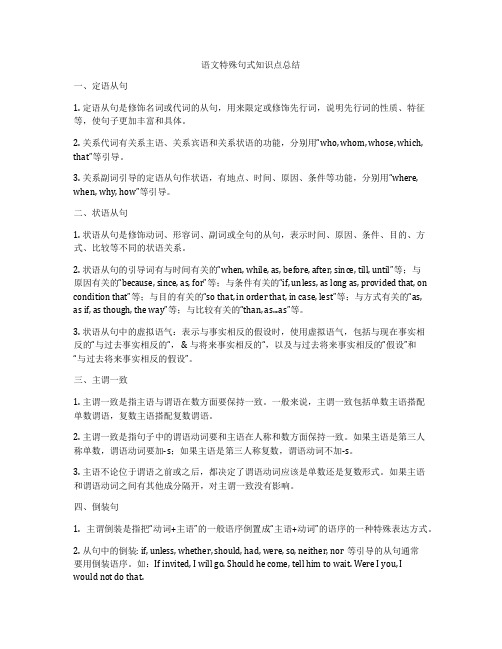
语文特殊句式知识点总结一、定语从句1. 定语从句是修饰名词或代词的从句,用来限定或修饰先行词,说明先行词的性质、特征等,使句子更加丰富和具体。
2. 关系代词有关系主语、关系宾语和关系状语的功能,分别用“who, whom, whose, which, that”等引导。
3. 关系副词引导的定语从句作状语,有地点、时间、原因、条件等功能,分别用“where, when, why, how”等引导。
二、状语从句1. 状语从句是修饰动词、形容词、副词或全句的从句,表示时间、原因、条件、目的、方式、比较等不同的状语关系。
2. 状语从句的引导词有与时间有关的“when, while, as, before, after, since, till, until”等;与原因有关的“because, since, as, for”等;与条件有关的“if, unless, as long as, provided that, on condition that”等;与目的有关的“so that, in order that, in case, lest”等;与方式有关的“as, as if, as though, the way”等;与比较有关的“than, as...as”等。
3. 状语从句中的虚拟语气:表示与事实相反的假设时,使用虚拟语气,包括与现在事实相反的“与过去事实相反的“, & 与将来事实相反的“,以及与过去将来事实相反的“假设”和“与过去将来事实相反的假设”。
三、主谓一致1. 主谓一致是指主语与谓语在数方面要保持一致。
一般来说,主谓一致包括单数主语搭配单数谓语,复数主语搭配复数谓语。
2. 主谓一致是指句子中的谓语动词要和主语在人称和数方面保持一致。
如果主语是第三人称单数,谓语动词要加-s;如果主语是第三人称复数,谓语动词不加-s。
3. 主语不论位于谓语之前或之后,都决定了谓语动词应该是单数还是复数形式。
特殊句式知识点详解(初中英语专项复习)4
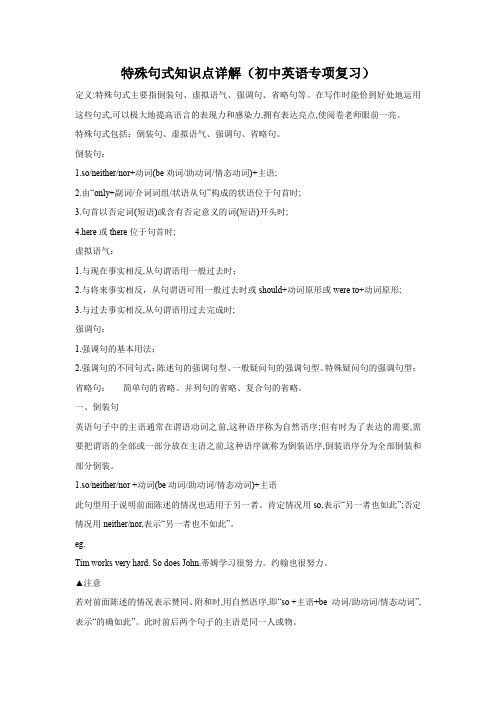
特殊句式知识点详解(初中英语专项复习)定义:特殊句式主要指倒装句、虚拟语气、强调句、省略句等。
在写作时能恰到好处地运用这些句式,可以极大地提高语言的表现力和感染力,拥有表达亮点,使阅卷老师眼前一亮。
特殊句式包括:倒装句、虚拟语气、强调句、省略句。
倒装句:1.so/neither/nor+动词(be劝词/助动词/情态动词)+主语;2.由“only+副词/介词词组/状语从句”构成的状语位于句首时;3.句首以否定词(短语)或含有否定意义的词(短语)开头时;4.here或there位于句首时;虚拟语气:1.与现在事实相反,从句谓语用一般过去时;2.与将来事实相反,从句谓语可用一般过去时或should+动词原形或were to+动词原形;3.与过去事实相反,从句谓语用过去完成时;强调句:1.强调句的基本用法;2.强调句的不同句式:陈述句的强调句型、一般疑问句的强调句型、特殊疑问句的强调句型;省略句:简单句的省略、并列句的省略、复合句的省略。
一、倒装句英语句子中的主语通常在谓语动词之前,这种语序称为自然语序;但有时为了表达的需要,需要把谓语的全部或一部分放在主语之前,这种语序就称为倒装语序,倒装语序分为全部倒装和部分倒装。
1.so/neither/nor +动词(be动词/助动词/情态动词)+主语此句型用于说明前面陈述的情况也适用于另一者。
肯定情况用so,表示“另一者也如此”;否定情况用neither/nor,表示“另一者也不如此”。
eg.Tim works very hard. So does John.蒂姆学习很努力。
约翰也很努力。
▲注意若对前面陈述的情况表示赞同、附和时,用自然语序,即“so +主语+be 动词/助动词/情态动词”,表示“的确如此”。
此时前后两个句子的主语是同一人或物。
eg .-She likes Chinese very much.他非常喜欢汉语。
-So she does.的确如此。
语法知识—特殊句式的全集汇编含答案解析

一、选择题1.Here ________ an email for you.A.is B.are C.has D.have 2.—I haven’t seen the movie Hero Is Back—______________. Let’s go to see it together this Sunday.A.Me, too. B.Me neither. C.Yes, please.3.一The pen writes well though it is only worth fifteen yuan.一Let me have a try. So .A.it is B.it does C.is it D.does it4.—I didn’t go swimming yesterday afternoon.— . I had to clean up my bedroomA.So did I B.So I did C.Neither I did D.Neither did I5.----She stayed up late last night. She can hardly do more work now.---- . I’ m too tired.A.So can I. B.So I canC.Neither can I D.Neither I can.6.--- He’s hardly been late for school recently. ---__________.A. So is his cousin B. So has his cousinC. Neither is his cousin D. Neither has his cousin7.—I’m not going swimming tomorrow afternoon.— ________. I have to clean up my bedroom.A.So am I B.Neither am I C.Neither I am D.So I am 8.__________ a book and some pens on the desk.A.There is B.There are C.There has D.There have 9.---I dislike geography.--- . It’s really difficult.A.So am I B.So do I C.Neither do I D.Neither am I. 10.____________ is important for us ____________ sports every dayA.It; do B.That; to do C.This; to do D.It; to do.11.—I don’t like showers or windy weather.—______________.A.Me too B.Me neitherC.So I do D.Neither I do12.—I can't understand any word of the passage (文章).—________ can I. I really want to know what it says.A.Neither B.So C.Either D.Even 13.- David wants to work as an architect when he grows up.-______________.A.So am I B.Neither am I C.So do I D.Neither do I 14.Jim works hard at his Chinese, and ___________.A.so Lucy does B.so is LucyC.so does Lucy D.so Lucy is15.---I‘ve never seen such a big garden.---_______.A.So have I. B.So do I. C.Neither have I. D.Neither do I. 16.—Our class is going to have a big party on the evening of June 16.—Cool! But if Chen Ming doesn't go, _______.A.so will I B.so do I C.neither will I D.neither do I 17.---It’s said that the film FrozenII can really amaze us. But I haven’t seen it yet.---__________.A.So do I B.So have I C.Neither do I D.Neither have I 18.What do you think ______solve the problem?A.you can do B.can you doC.you can do to D.can you do to19.It was the third time________she ________History Museum.A.that; visited B.that; have visited C.which; had visited D.that; had visited 20.—I’m not going shopping tomorrow afternoon.— . I have to clean up my bedroom.A.So am I B.Neither am I C.Neither I am21.—I won’t stay up late.—________.A.So will I B.Neither I will C.Neither will I二、1322.— Would you please us some photos of the fashion show?— Sure!A.to give; Here are the photos. B.show; Here are the photosC.give; Here the photos are D.to show; Here the photos are23.---Would you like to go to the amusement park ? ---If Jack does , .A.so I go , too B.so will I C.neither will I D.so do I24.If you don’t go to see the film tonight, _______.A.so don’t I B.so won’t IC. neither do I D. neither will I25.—You should be careful when .—Yes, I will. I want to know when to have a rest.A.driving; stopping B.driving; to stopC.to drive; stopping D.to drive; to stop【参考答案】***试卷处理标记,请不要删除一、选择题1.A解析:A【解析】【详解】句意:这是一封给你的电子邮件。
特殊句式知识点详解(初中英语专项复习)1
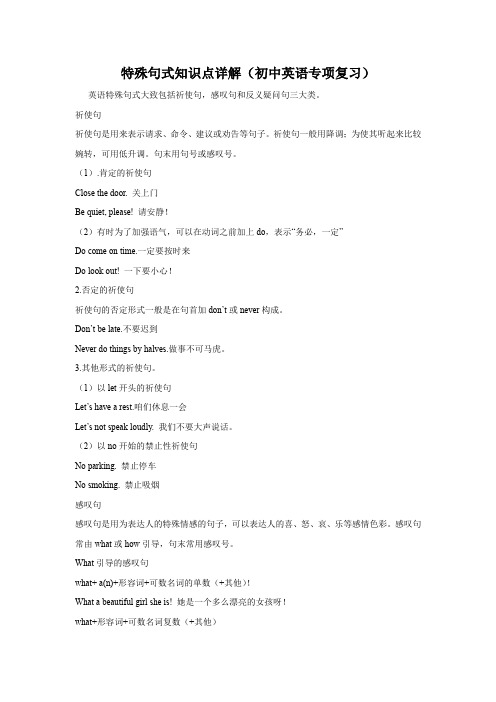
特殊句式知识点详解(初中英语专项复习)英语特殊句式大致包括祈使句,感叹句和反义疑问句三大类。
祈使句祈使句是用来表示请求、命令、建议或劝告等句子。
祈使句一般用降调;为使其听起来比较婉转,可用低升调。
句末用句号或感叹号。
(1).肯定的祈使句Close the door. 关上门Be quiet, please! 请安静!(2)有时为了加强语气,可以在动词之前加上do,表示“务必,一定”Do come on time.一定要按时来Do look out! 一下要小心!2.否定的祈使句祈使句的否定形式一般是在句首加don’t或never构成。
Don’t be late.不要迟到Never do things by halves.做事不可马虎。
3.其他形式的祈使句。
(1)以let开头的祈使句Let’s have a rest.咱们休息一会Let’s not speak loudly. 我们不要大声说话。
(2)以no开始的禁止性祈使句No parking. 禁止停车No smoking. 禁止吸烟感叹句感叹句是用为表达人的特殊情感的句子,可以表达人的喜、怒、哀、乐等感情色彩。
感叹句常由what或how引导,句末常用感叹号。
What引导的感叹句what+ a(n)+形容词+可数名词的单数(+其他)!What a beautiful girl she is! 她是一个多么漂亮的女孩呀!what+形容词+可数名词复数(+其他)what important jobs they have done! 他们做了多么重要的工作呀!what+形容词+不可数名字(+其他)what fine weather it is! 多好的天气呀!How引导的感叹句(1)how+形容词或副词(+其他)How interesting the dog is ! 多么有趣的狗呀!(2)how+形容词+a(an)+可数名词单数(+其他)!How useful a subject they are learning! 他们正在学的科目多么有用呀!how+ 主语+谓语(+其他)How time flies! 时间过得真快呀!3. 有时一个陈述句、疑问句、祈使句,甚至一个词或词组,都可以成为感叹句来表示强烈的感情,这时句末用感叹号。
语法知识—特殊句式的全集汇编含解析
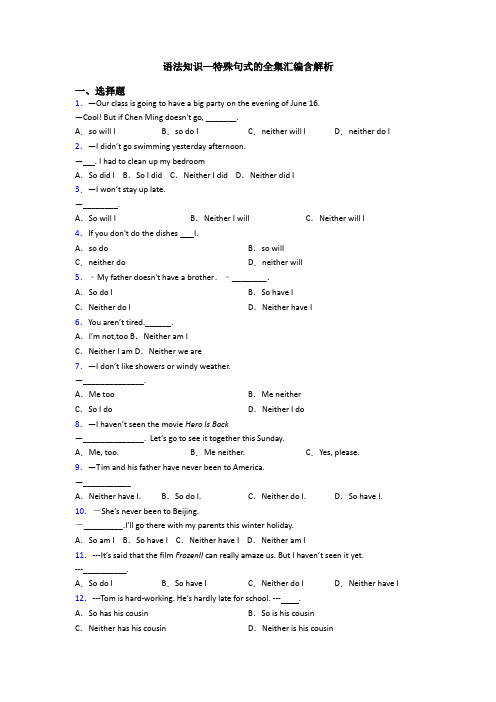
语法知识—特殊句式的全集汇编含解析一、选择题1.—Our class is going to have a big party on the evening of June 16.—Cool! But if Chen Ming doesn't go, _______.A.so will I B.so do I C.neither will I D.neither do I 2.—I didn’t go swimming yesterday afternoon.— . I had to clean up my bedroomA.So did I B.So I did C.Neither I did D.Neither did I3.—I won’t stay up late.—________.A.So will I B.Neither I will C.Neither will I4.If you don't do the dishes I.A.so do B.so willC.neither do D.neither will5.﹣My father doesn't have a brother.﹣________.A.So do I B.So have IC.Neither do I D.Neither have I6.You aren’t tired.______.A.I’m not,too B.Neither am IC.Neither I am D.Neither we are7.—I don’t like showers or windy weather.—______________.A.Me too B.Me neitherC.So I do D.Neither I do8.—I haven’t seen the movie Hero Is Back—______________. Let’s go to see it together this Sunday.A.Me, too. B.Me neither. C.Yes, please. 9.—Tim and his father have never been to America.—___________A.Neither have I. B.So do I. C.Neither do I. D.So have I. 10.-She’s never been to Beijing.-_________.I’ll go there with my parents this winter holiday.A.So am I B.So have I C.Neither have I D.Neither am I11.---It’s said that the film FrozenII can really amaze us. But I haven’t seen it yet.---__________.A.So do I B.So have I C.Neither do I D.Neither have I 12.---Tom is hard-working. He’s hardly late for school. --- .A.So has his cousin B.So is his cousinC.Neither has his cousin D.Neither is his cousin13.In the next photo ________ Tom and his parents.A.be B.am C.is D.are 14.What do you think ______solve the problem?A.you can do B.can you doC.you can do to D.can you do to15.Here _______a nice photo of my family.A.am B.be C.is D.are 16.—There are many advertisements on TV every day, but I don’t like them.— __________. Watching them is just a waste of time.A.So do I B.So am IC.Neither do I D.Neither am I17.—I’m not going shopping tomorrow afternoon.— . I have to clean up my bedroom.A.So am I B.Neither am I C.Neither I am 18.---I don't usually go to a furniture shop.---________ Miss Wang.A.So does B.So did C.Neither does D.Neither did 二、1319.Here _______ some apples.A.have B.has C.are D.is20.-- She likes playing football.-- _____________.A.So do I. B.Neither do I. C.So I do.21.If you don’t go to see the film tonight, _______.A.so don’t I B.so won’t IC. neither do I D. neither will I22.—It’s very hot in Chongqing in summer. — here.A.So it is B.So is it C.So it does D.So does it23.Jim visited his math teacher this morning, but Tom ______.A.wasn’t B.doesn’t C.didn’t D.isn’t 24.—I don’t like smoking.─_____________.A.Neither he is B.Neither is heC.Neither he does D.Neither does he25.—You should be careful when .—Yes, I will. I want to know when to have a rest.A.driving; stopping B.driving; to stopC.to drive; stopping D.to drive; to stop【参考答案】***试卷处理标记,请不要删除一、选择题1.C解析:C【解析】【详解】句意:——我们班将在6月16日晚上举行一个大型聚会。
语法知识—特殊句式的单元汇编附解析

一、选择题1.We have seven lessons every day. MaryA.So has B.Neither has C.So does D.Neither does 2.__________ a book and some pens on the desk.A.There is B.There are C.There has D.There have 3.---I dislike geography.--- . It’s really difficult.A.So am I B.So do I C.Neither do I D.Neither am I. 4.To the east of the forest_______some monkeys.A.is B.are C.has D.have5.If you don't do the dishes I.A.so do B.so willC.neither do D.neither will6.Here ________ an email for you.A.is B.are C.has D.have7.—I used to eat a lot of junk food.—________.A.So do I B.Neither do I C.So did I D.Neither did I 8.I like swimming. __________ my mother.A.So is B.So does C.Neither is D.Neither does 9.—I don’t like doing eye exer cises.—_____.A.So do I B.So am I C.Neither do I D.Neither am I 10.—I plan to visit the Summer Palace on the coming New Year’s Day. How about you?—If it doesn’t snow, ____.A.so will I B.so do I C.neither do I D.Nor will I 11.--Tom won’t go to the park with us this Saturday.--___________.A.So will I. B.So do I. C.Neither have I. D.Neither will I. 12.-She’s never been to Beijing.-_________.I’ll go there with my parents this winter holiday.A.So am I B.So have I C.Neither have I D.Neither am I13.- I'm afraid Jim knows little English. -_______. I failed the English exam again. A.So am I B.So do I C.Neither am I D.Neither do I 14.Here _______ a set of _______ for you, Peter.A.is; key B.are; keys C.is; keys D.are; key 15.—I will never come to this restaurants again. The food is terrible!—__________.A.Nor am I B.Neither will I C.So will I D.So do I16.---It’s said that the film FrozenII can really amaze us. But I haven’t seen it yet.---__________.A.So do I B.So have I C.Neither do I D.Neither have I 17.—Li Yuchun sings so well, I like her very much.—____________.A.So am I B.So does she C.So I do D.So she does 18.What do you think ______solve the problem?A.you can do B.can you doC.you can do to D.can you do to19.Here _______a nice photo of my family.A.am B.be C.is D.are20.—I went to bed late last night. —______.A.So am I B.So was I C.So do I D.So did I21.It was the third time________she ________History Museum.A.that; visited B.that; have visited C.which; had visited D.that; had visited 22.- David wants to work as an architect when he grows up.-______________.A.So am I B.Neither am I C.So do I D.Neither do I二、1323.-I have never visited a paper factory. -________A.So I have B.So have I C.Neither have I D.I haven`t24.Here _________ the results of our survey. About 90 percent of students _________ playing computer games.A.is; like B.are; are like C.are; like25.If you don’t go to see the film tonight, _______.A.so don’t I B.so won’t IC. neither do I D. neither will I【参考答案】***试卷处理标记,请不要删除一、选择题1.C解析:C【解析】【详解】句意:我们每天有七节课。
专题11 特殊句式 (解析版)

专题11 特殊句式(解析版)Part 1:知识点梳理1.倒装的必备条件及具体应用;2.省略的基本原则及用法;3.强调句的基本结构、句式及其与相似主从复合句的区别。
知识点1倒装1:完全倒装种类倒装条件例句完全倒装here,there,up,down,in,out,off,away等副词开头的句子表示强调Out rushed the children.表示地点的介词短语作状语位于句首Under the tree stood twotables and four chairs.强调表语,置于句首,或为保持句子平衡Present at the meeting were1,000 students.种类倒装条件例句部分倒装never,hardly,scarcely,seldom,little,not until,not等表示否定意义的副词放于句首Hardly did I know whathad happened.only和修饰的状语放于句首Only then did he realizethe importance of English.not only...but also...连接并列的句子,前倒后不倒Not only does he knowFrench,but also he is expert atit.neither...nor...连接并列的句子,前后都倒装Neither do I know it,nordo I care about it.so...that,such...that中的so或such及被修饰的成分放于句首时,主谓要倒装So busy is he that hecannot go on a holiday.as引导的让步状语Child as he is,he haslearned a lot.so,neither或nor表示前句内容也适用于另外的人或事He can play the piano.Socan I.用于表示祝愿的祈使句中May you be in goodhealth!省略if的虚拟条件Were I you,I would not do it in this way.知识点2 省略1. 不定式的省略(1)在动词不定式结构中,为了避免重复,常常省略不定式结构中的动词,只保留to,常见的词或结构有expect, forget, hope, intend, like, love, mean, prefer, refuse, seem, try, want, wish, glad, happy, pleased, delighted, have, need, ought, used, be going, be about, be sure, be afraid, be certain, be likely, be ready, be supposed等。
特殊结构的用法总结与归纳倒装句省略句被动语态等特殊句型解析

特殊结构的用法总结与归纳倒装句省略句被动语态等特殊句型解析特殊结构是指在英语语法中,具有一定特殊用法或形式的句子结构。
这些特殊结构包括倒装句、省略句和被动语态等。
本文将对这些特殊句型进行总结与归纳,并解析其具体用法。
1. 倒装句(Inversion Sentences)倒装句是指将主语和谓语的语序颠倒的句型。
主要分为完全倒装和部分倒装两种情况。
1.1 完全倒装(Full Inversion)完全倒装句的结构是将助动词、情态动词或者be动词放在句首,其后紧跟主语,再接上谓语动词。
例:Never have I seen such a beautiful sunset.Not only does she play the violin, but she also sings beautifully.1.2 部分倒装(Partial Inversion)部分倒装句通常在以下情况下使用:1)当表示否定意义的副词或短语放在句首时;2)当表示“只有”之类的副词或短语放在句首时;3)当表示“地方状语+副词”或“副词+副词”时。
例:Under no circumstances can you leave the classroom.Only in this way can we solve the problem.Upstairs in his room sat the boy.2. 省略句(Elliptical Sentences)省略句是指在句子中省略了某些成分,但读者或听者通过上下文仍能理解被省略的内容。
省略句可以简化表达,增强语言流畅性。
2.1 主语的省略当前后两个句子的主语一致时,可以省略第二个句子中的主语。
例:Mary is playing basketball. John is playing basketball too.→ Mary is playing basketball. So is John.2.2 谓语的省略在某些情况下,如果主语都一样,谓语动词可以省略。
高考英语特殊句式分类汇总
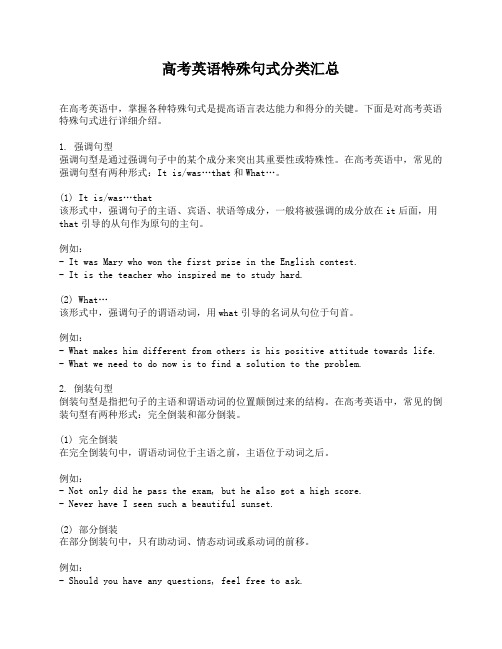
高考英语特殊句式分类汇总在高考英语中,掌握各种特殊句式是提高语言表达能力和得分的关键。
下面是对高考英语特殊句式进行详细介绍。
1. 强调句型强调句型是通过强调句子中的某个成分来突出其重要性或特殊性。
在高考英语中,常见的强调句型有两种形式:It is/was…that和What…。
(1) It is/was…that该形式中,强调句子的主语、宾语、状语等成分,一般将被强调的成分放在it后面,用that引导的从句作为原句的主句。
例如:- It was Mary who won the first prize in the English contest.- It is the teacher who inspired me to study hard.(2) What…该形式中,强调句子的谓语动词,用what引导的名词从句位于句首。
例如:- What makes him different from others is his positive attitude towards life. - What we need to do now is to find a solution to the problem.2. 倒装句型倒装句型是指把句子的主语和谓语动词的位置颠倒过来的结构。
在高考英语中,常见的倒装句型有两种形式:完全倒装和部分倒装。
(1) 完全倒装在完全倒装句中,谓语动词位于主语之前,主语位于动词之后。
例如:- Not only did he pass the exam, but he also got a high score.- Never have I seen such a beautiful sunset.(2) 部分倒装在部分倒装句中,只有助动词、情态动词或系动词的前移。
例如:- Should you have any questions, feel free to ask.- Can you imagine how excited I was when I received the good news?3. 条件句型条件句型是指表示条件关系的句子结构。
特殊句式讲解
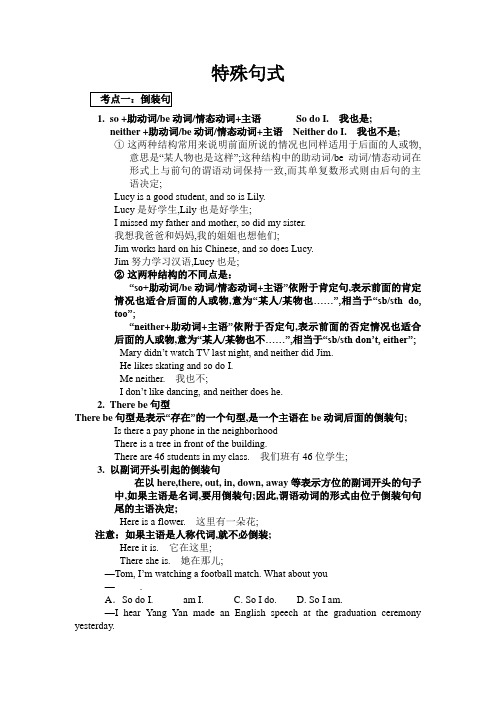
特殊句式1.so +助动词/be动词/情态动词+主语So do I. 我也是;neither +助动词/be动词/情态动词+主语Neither do I. 我也不是;①这两种结构常用来说明前面所说的情况也同样适用于后面的人或物,意思是“某人物也是这样”;这种结构中的助动词/be动词/情态动词在形式上与前句的谓语动词保持一致,而其单复数形式则由后句的主语决定;Lucy is a good student, and so is Lily.Lucy是好学生,Lily也是好学生;I missed my father and mother, so did my sister.我想我爸爸和妈妈,我的姐姐也想他们;Jim works hard on his Chinese, and so does Lucy.Jim努力学习汉语,Lucy也是;②这两种结构的不同点是:“so+助动词/be动词/情态动词+主语”依附于肯定句,表示前面的肯定情况也适合后面的人或物,意为“某人/某物也……”,相当于“sb/sth do,too”;“nei ther+助动词+主语”依附于否定句,表示前面的否定情况也适合后面的人或物,意为“某人/某物也不……”,相当于“sb/sth don’t, either”;Mary didn’t watch TV last night, and neither did Jim.He likes skating and so do I.Me neither. 我也不;I don’t like dancing, and neither does he.2.There be句型There be句型是表示“存在”的一个句型,是一个主语在be动词后面的倒装句;Is there a pay phone in the neighborhoodThere is a tree in front of the building.There are 46 students in my class. 我们班有46位学生;3.以副词开头引起的倒装句在以here,there, out, in, down, away等表示方位的副词开头的句子中,如果主语是名词,要用倒装句;因此,谓语动词的形式由位于倒装句句尾的主语决定;Here is a flower. 这里有一朵花;注意:如果主语是人称代词,就不必倒装;Here it is. 它在这里;There she is. 她在那儿;—Tom, I’m watching a football match. What about you—_____.A.So do I. am I. C. So I do. D. So I am.—I hear Yang Yan made an English speech at the graduation ceremony yesterday.—_____, and_____.she did; so did I did she; so I didshe was; so I was was she; so I was—After reading the story about Jin Jing, I was very_____.—_____. She’s really brave.; So was I B. impressing; So did IC. impressed; So was ID. relaxing; So I did—Do you think we’ll need a coffee pot—I don’t drink coffee, and_____. It’s not necessary. Why not a tea servicedo you you do you do do you—I am interested in science. What about you—_____.do I am I C. So I am—There_____no milk in the fridge. Could you get some fro me, Dick—All right, Mum.—Jim is trying his best to learn Chinese Kung Fu.—_____.does Mike is MikeMike does Mike is考点二:由代词it构成的一些特殊句式1.用作形式主语,常用于下列句型:①It’s+adj.+for sbto do sthIt’s not necessary to be the same. 没有必要是相同的;It is difficult for us to do so much homework in such a short time.It’s easy to have a healthy life style, and it’s important to eat a balanced diet.②It’s time to do/for/that….It’s time to go to school/for dinner/that we went for the party.When it was time for dessert, she turned off the lights.③It seems that….看起来好像……It seems that most students hope to have a good education and find a good job.④It’s one’s turn to do sth 轮到某人做某事It’s our turn to clean the classroom. 轮到我们打扫教室了;It’s your turn to speak in the meeting. 轮到你在会上发言了;⑤It’s+adj.+that从句It’s necessary that you should study hard at the moment.2.作形式宾语;Do you think it important to learn to do housework3.引导强调句型:It is/was+被强调部分+that/who/whom+其他成分It was on that cold night that we saw an exciting film.All of us find_____necessary to take exercise every day.—Two Evening Papers, please—Only one copy left. Would you like to have_____, sirMost young people find_____exciting to watch a football match.考点三:感叹句1.what引导的感叹句①What+aan+adj.+可数名词单数+主语+谓语What a beautiful girl she is 她是一个多么漂亮的女孩呀What an exciting trip it was 多么令人兴奋的旅行呀②What+adj.+可数名词复数+主语+谓语What important jobs they have done 他们做了多么重要的工作呀What beautiful dresses they are 多么美丽的衣服呀③What+adj.+不可数名词+主语+谓语What sweet water it is 多甜的水呀What hard work this is 这是多么困难的工作啊2.how引导的感叹句How+adj./adv.+主语+谓语How interesting the dog is 多么有趣的狗呀How cold it is today 今天真冷呀How beautiful these flowers are 这些花多美啊How clearly he is speaking 他说得多么清楚啊How+adj.+a/an+可数名词单数+主语+谓语How useful a subject they are learning他们正在学的科目多么有用呀How+主语+谓语How time flies 时间过得真快呀3.一些特殊形式①在陈述句、祈使句或疑问句句末加感叹号变成感叹句,表示某种强烈的感情;He runs so fast 他跑得真快呀Do read it carefully 一定要仔细阅读②用一个词或词组构成的表示强烈感情的句子也是感叹句;Wonderful 好极了Look out 小心Great 太棒了③以there, here等副词开头的感叹句;There she is 她在那儿There goes the bell 铃响了4.如何判断用what还是用how来引导感叹句①凡是以a,an开头的,多用what;②凡是形容词直接加名词的,多用what;③其他一般用how;_____good job she does She is really a clever girl.a D. How aMary got good grades in school. _____excited she isa a—Tan Qianqiu, a politics teacher, died in order to save his four students in the earthquake地震in Wenchuan.—_____teachers he isA.How excellentB. What an excellent a excellent—I hear that an old people are traveling around China by bike.\—Oh, _____long way on their bicycles They are so greata a肯定句的祈使句:①句型:动词原形省略主语+其他;Make your own rules 给自己制定规则Come in 进来Be quiet 安静Take a taxi from the airport. 从机场坐出租车;And go along Dongchang’an Jie, and turn left into Wangfujing Dajie.②有时为了加强语气,可以在动词前加上do,表示“务必,一定”;Do come on time 一定要准时到Do look out 一定要小心否定句的祈使句:①句型:Don’t+动词原形;Don’t eat in the class 不要在课堂上吃东西Don’t be late不要迟到Don’t come out 不要出去②Let’s+not+动词原形Let’s not speak loudly反义疑问句1其基本结构有两种:一是“肯定陈述句+简略否定问句”;二是“否定陈述句+简略肯定问句”;反意疑问句后一部分的主谓与前一部分的主谓要保持人称及助动词等方面的一致;这种疑问句的回答要根据事实,肯定的用“Yes, …”;否定的用“No, …”;如:It looks like rain, doesn’t itHe doesn’t need to work so late, does he21陈述部分的主语是this, that时,疑问部分的主语多用it;陈述部分的主语是these, those时,疑问部分的主语多用they;如:This is a dictionary, isn’t itThose are shelves, aren’t they2陈述句如果是there be结构时,疑问句部分仍用there;如:There once was a man named Saint Nicholas, wasn’t there3在英语口语中,“I am +表语结构”,后面的反意疑问句多用aren’t I来体现;如:I am very interested in learning English, aren’t I4陈述句的主语是动词不定式,动词的-ing形式或从句时,疑问部分的主语多用it来体现;如:Taking care of our environment is very important, isn’t itWhat he said is righ t, isn’t it5陈述句中含有not, no, hardly, neither, never, few, little, too …to等否定词或具有否定意义的词时,疑问部分常用肯定形式;如:Few people knew the news, did theyTom has never been to England , has he但陈述句中如果带有否定意义的前缀和后缀的单词时,整个句子仍视为肯定句,反意疑问部分多用否定形式;如:She is unhappy, i sn’t she6陈述句的主语是nobody, no one, everyone, somebody等不定代词时,反意疑问部分的主语多用they当强调全体时或he当强调个体时;如果陈述句的主语是something, nothing, anything, everything等不定代词时,反意疑问部分的主语多用it;如:No one knows him, do theySomeone is waiting for you, isn’t heNobody says a word about the accident, do theyEverything seems all right, doesn’t it7陈述句是主从复合句时,如果主句的谓语动词是think, believe, expect, feel, guess等词,且主语是第一人称I或we时,反意疑问部分的人称、时态与宾语从句保持一致,同时还要考虑到否定的转移否定前移;如:I believe that the boy can get a ticket for you, can’t heI don't think he is bright, is heWe believe she can do it better, can't she若是第二第三人称的话,反义疑问句应该看主句:She thought it is meaningless,didn't she如果是转述的要注意:He said that you were in hospital,weren't you这里是对着那个you说的8祈使句的反义疑问句中:let's 的要用shall we;let us 的要用will you;其他形式的都用will you;如:Go and get it for me, won't you去帮我取个东西,好吗Let's meet at the airport, shall we 我们在机场碰头,行不行Have a little more wine, will you 喝点儿酒,好吗9must的反义疑问句:陈述部分有must 的疑问句,疑问部分根据实际情况而定;A.must表示“应该”,其疑问部分用mustn't不应该,如:You must work hard next term, mustn't you 下学期你应该努力学习,对吗B.must表示“必须”,其疑问部分用needn't不必,如:They must finish the work today, needn’t they 他们今天必须要完成这项工作,是吗C.陈述部分含情态动词mustn't,表示禁止时,疑问部分就可以用must或may,如:You mustn’t stop your car here, must you ma y we你不能把车停在这地方,知道吗D.must表示推测,其疑问部分必须与must 后面的主要动词相呼应;如:①对现在动作或存在的情况的推测:You must know the answer to the exercise, don't you 你一定知道这项练习的答案,是不是That must be your bed, isn't it 那一定是你的床,是吗②对过去发生的动作或存在的情况的推测:句中陈述部分没有表示过去的时间状语,这时疑问部分中的动词就用现在完成时;haven’t / hasn’t + 主语You must have told her about it, haven’t you 你一定把这事告诉她了,是吗10have作为动词的反义疑问句:①have to 的短语,且只充当一般动词的作用,助动词为do,does,和普通的一般疑问句没有任何差别,提问还是用do,does引导;We have to finish it ,don't we②当用have,has做助动词的时候,疑问句才用它们引导,如:She has seen it,hasn't she这里的助动词就是has③当陈述部分有had better,或其中的have表示完成时态时,疑问句应用hadn’t 等开头:You’d better get up early, hadn’t you④其他情况句中有have时疑问句应用don't等开头;如have表示“有”的时候,有两种形式:do或haveHe has two sisters,doesn't he =He has two sisters,hasn't heHe doesn't have any sisters, does he⑤当must+have done表示对过去的情况进行推测一般句中有明确的过去时间状语,问句要根据陈述部分谓语的情况用“didn't+主语”或“wasn't/weren't+主语”;如果强调动作的完成一般没有明确的过去时间状语,问句要用“haven't/hasn't+主语”;She must have read the novel last week,didn't she 她上星期一定读了这本小说,是吗You must have told her about it, haven't you你一定把这事告诉她了,是吗11带情态动词dare或need的反意疑问句,疑问部分常用need dare +主语;We need not do it again, need weHe dare not say so, dare you当dare, need 为实义动词时,疑问部分用助动词do + 主语;She doesn't dare to go home alone, does she12感叹句中,疑问部分用be +主语;What colours, aren't theyWhat a smell, isn't it13陈述部分由neither… nor, either… or 连接的并列主语时,疑问部分根据其实际逻辑意义而定;Neither you nor I am engineer, are we14陈述部分的谓语是wish,疑问部分要用may +主语;I wish to have a word with you, may I15含有ought to 的反意疑问句,陈述部分是肯定的,疑问部分用shouldn't / oughtn't +主语;He ought to know what to do, oughtn't he / shouldn't he16陈述部分的谓语是used to 时,疑问部分用didn't +主语或usedn't +主语;He used to take pictures there, didn't he / usedn't he17陈述部分有would rather +v.,疑问部分多用wouldn't +主语;He would rather read it ten times than recite it, wouldn't he18陈述部分有You'd like to +v. 疑问部分用wouldn't +主语;You'd like to go with me, wouldn't you对反意疑问句的回答,无论问题的提法如何,如果事实是肯定的,就用yes,事实是否定的,就要用no;要特别注意陈述句部分是否定结构,反意疑问句部分用肯定式提问时,回答yes或no与汉语正好相反;这种省略回答的yes要译成“不”,no要译成“是”;例---He likes playing football, doesn’t he 他喜欢踢足球,是吗---Yes, he does. / No, he doesn’t. 是的;/ 不是;---His sister didn’t attend the me eting, did she 他妹妹没有参加会议,是吗---Yes, she did. / No, she didn’t. 不,她参加了;/ 是的,她没参加;考点六:强调句英语表达中,要强调句子的某一成分,一般可用强调句型“It is was +that who +句子的其余部分”;It在句中无意义,只起引出被强调部分的作用;被强调的部分指人时,除可用that外,还可换用who强调宾语指人时也可用whom;使用强调句型时,应注意以下事项:一、去掉强调结构It is was … thatwho…后,剩下的词仍能组成一个完整的句子;这是判断是不是强调句型的关键;试比较:1. It is strange that he didn’t come yesterday.2. It is you and Tom that didn’t come yesterday.1. It is what you do rather than what you say ____matters.05天津2. That was really a splendid evening. It’s years ____I enjoyed myself so much.A. whenB. thatC. beforeD. since 05安徽二、如果强调时间、地点、原因或方式状语时,不可用when, where, why或how,而仍用that;试比较:It was because of the accident why he was late. 误, It was because of the accident that he was late. 正;又如:1. It was not until midnight____they reached the camp site. 08重庆A. thatB. whenC. whileD. as2. It was after he got what he had desired ____he realized it was not so important.06辽宁A. thatB. whenC. sinceD. as3. It was in New Zealand ___ Elizabeth first met Mr. Smith. 08全国IIA. thatB. howC. whichD. when三、注意强调句型的否定句和疑问句形式,在这方面很容易因弄不清句子结构而错选;如:1. I just wonder ____that makes him so excited.06山东A. why it doesB. what he doesC. how it isD. what it is2. It was not until she got home ____Jennifer realized she had lost her keys.A. whenB. thatC. whereD. before06全国卷二四、强调主语时,that或who后面的谓语动词的形式仍然取决于原句中的主语;be的变化只有is和was两种形式,如果要表示现在时将来时的其它各种形式时,就用It is…, 表达过去时的各种形式时,用It was….一般要与谓语动词的时态一致;如:1. It is I who/ that am an English teacher.2. It is the boy who/ that speaks English best in theclass.3. It was on Sunday that he gave George this ticket.4. It is the little girl who/ that has broken the glass.五、在复习中有可能把It is/ was…that句式都误认为是强调句型的几种情况:1、把具有实际意义的指示代词it后面接is/was…that误认为是强调句式;--- Where did you get to know her07山东--- It was on the farm ____ we worked.A.thatB.thereC.which D . where2、把it指时间、天气、距离、环境等后接be的情形误以为是强调句型;It was twenty miles from our city to the village ____the accident happened.3、把It is/ was…that结构的主语从句误认为是强调句型;The Foreign Minister said, “____our hope that the two sides will work towards peace.”04北京A. This isB. There isC. That isD. It is强调句型It is/ was… that/ who主要用来强调句子的主语、宾语、状语或表语;如果要强调谓语动词,应该用代动词do及其变形does或did,这三种形式常用在谓语动词之前,以加强语气;它一般只能强调现在时与过去时;如:I do wish I could. 我真希望我能;He does look well. 他的确看起来气色很好;You did give me a fright. 你真把我给吓了一跳;。
语法知识—特殊句式的分类汇编及答案解析
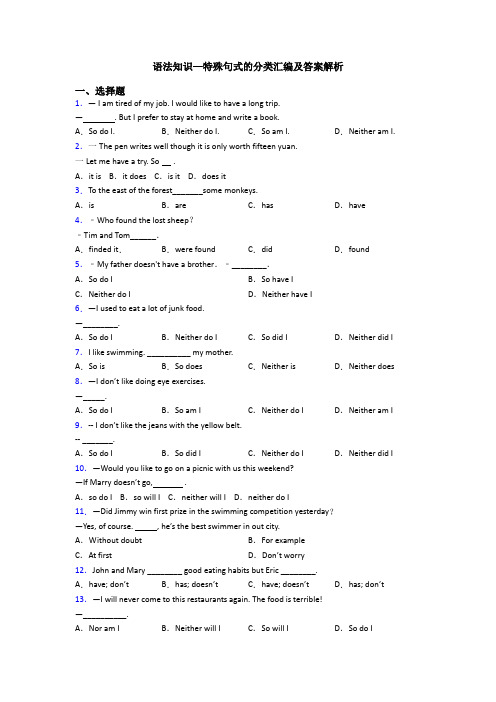
语法知识—特殊句式的分类汇编及答案解析一、选择题1.— I am tired of my job. I would like to have a long trip.— . But I prefer to stay at home and write a book.A.So do I. B.Neither do I. C.So am I. D.Neither am I. 2.一The pen writes well though it is only worth fifteen yuan.一Let me have a try. So .A.it is B.it does C.is it D.does it3.To the east of the forest_______some monkeys.A.is B.are C.has D.have4.﹣Who found the lost sheep?﹣Tim and Tom______.A.finded it.B.were found C.did D.found 5.﹣My father doesn't have a brother.﹣________.A.So do I B.So have IC.Neither do I D.Neither have I6.—I used to eat a lot of junk food.—________.A.So do I B.Neither do I C.So did I D.Neither did I 7.I like swimming. __________ my mother.A.So is B.So does C.Neither is D.Neither does 8.—I don’t like doing eye exercises.—_____.A.So do I B.So am I C.Neither do I D.Neither am I 9.-- I don’t like the jeans with the yellow belt.-- _______.A.So do I B.So did I C.Neither do I D.Neither did I 10.—Would you like to go on a picnic with us this weekend?—If Marry doesn’t go, .A.so do I B.so will I C.neither will I D.neither do I11.—Did Jimmy win first prize in the swimming competition yesterday?—Yes, of course. , he’s the best swimmer in out city.A.Without doubt B.For exampleC.At first D.Don’t worry12.John and Mary ________ good eating habits but Eric ________.A.have; don’t B.has; doesn’t C.have; doesn’t D.has; don’t 13.—I will never come to this restaurants again. The food is terrible!—__________.A.Nor am I B.Neither will I C.So will I D.So do I14.---It’s said that the film FrozenII can really amaze us. But I haven’t seen it yet.---__________.A.So do I B.So have I C.Neither do I D.Neither have I 15.—Too bad weather! I don’t think I can go swimming tomorrow.—If you________go, ________I.A.don’t; neither do B.won’t; neither will C.don’t; so will D.don’t; neither will 16.Here _______a nice photo of my family.A.am B.be C.is D.are 17.—There are many advertisements on TV every day, but I don’t like them.— __________. Watching them is just a waste of time.A.So do I B.So am IC.Neither do I D.Neither am I18.— I think the plan is just a waste of time. What do you think?—Well, if you don’t support the plan, ________.A.neither do I B.so do I C.neither will I D.so will I 19.—I’m not going shopping tomorrow afternoon.— . I have to clean up my bedroom.A.So am I B.Neither am I C.Neither I am20.______ used to ______ a post office near my house.A.There; be B.There; have C.It; be D.There; having 21.—I can't understand any word of the passage (文章).—________ can I. I really want to know what it says.A.Neither B.So C.Either D.Even22.______was in 1997_____I graduated from the university.A.That, that B.It, that C.That, when D.It,when二、1323.— Would you please us some photos of the fashion show?— Sure!A.to give; Here are the photos. B.show; Here are the photosC.give; Here the photos are D.to show; Here the photos are24.—I have never visited a paper factory. —_____A.So have I. B.So I have. C.Neither have I. D.I haven’t no25.2.Mary doesn’t like doing chores at home and Jack.A.so does B.so doesn’tC.neither does D.neither doesn’t【参考答案】***试卷处理标记,请不要删除一、选择题1.C解析:C【解析】【详解】句意:——我厌倦我的工作了。
特殊句式知识点总结

特殊句式知识点总结在英语写作中,句式的多样性是提高文章质量和表达效果的关键因素之一。
使用特殊句式可以丰富你的写作风格,增加语言的表现力。
本文将针对常见的特殊句式进行总结和讲解,帮助读者掌握不同的句式结构和用法,从而提高英语写作的水平。
一、倒装句1.完全倒装句主语和谓语动词的位置颠倒,常见于以下情况:- Here comes the bus.- Little did I know that she was watching.2. 部分倒装句只有助动词或情态动词与主语的位置颠倒,常见于以下情况:- Never have I seen such a beautiful sunset.- Not only does she play the piano well, but she also sings beautifully.3. 否定副词位于句首时的倒装在否定副词开头的句子中,主语和谓语动词颠倒,常见于以下情况:- Seldom have I seen him so angry.- Barely had I arrived when the phone started ringing.倒装句的使用可以增加句子的变化和灵活性,使句子更加生动、抓人,但需要注意的是,倒装句不能随意使用,要根据句子的语境和表达的意思来决定是否使用倒装句。
二、强调句强调句是通过强调句子的一部分来突出该部分的重要性,使信息更加突出。
英语中的强调句有两种形式:部分强调和完全强调。
1. 部分强调部分强调是通过在句中加入强调词来使该部分的信息得到突出:- It was John who broke the vase.- It's this book that I want to read.2. 完全强调完全强调是通过借助助动词do或情态动词will加上动词原形来实现强调:- It was he who broke the vase.- It is this book that I will read.强调句的使用可以使句子更加生动、突出重点,但使用时要注意强调的对象,避免造成句子表达的混淆或误解。
语文特殊句式汇总
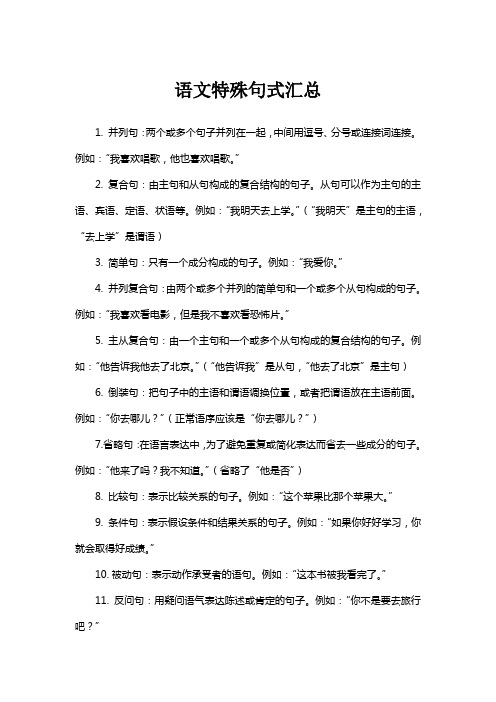
语文特殊句式汇总1. 并列句:两个或多个句子并列在一起,中间用逗号、分号或连接词连接。
例如:“我喜欢唱歌,他也喜欢唱歌。
”2. 复合句:由主句和从句构成的复合结构的句子。
从句可以作为主句的主语、宾语、定语、状语等。
例如:“我明天去上学。
”(“我明天”是主句的主语,“去上学”是谓语)3. 简单句:只有一个成分构成的句子。
例如:“我爱你。
”4. 并列复合句:由两个或多个并列的简单句和一个或多个从句构成的句子。
例如:“我喜欢看电影,但是我不喜欢看恐怖片。
”5. 主从复合句:由一个主句和一个或多个从句构成的复合结构的句子。
例如:“他告诉我他去了北京。
”(“他告诉我”是从句,“他去了北京”是主句)6. 倒装句:把句子中的主语和谓语调换位置,或者把谓语放在主语前面。
例如:“你去哪儿?”(正常语序应该是“你去哪儿?”)7.省略句:在语言表达中,为了避免重复或简化表达而省去一些成分的句子。
例如:“他来了吗?我不知道。
”(省略了“他是否”)8. 比较句:表示比较关系的句子。
例如:“这个苹果比那个苹果大。
”9. 条件句:表示假设条件和结果关系的句子。
例如:“如果你好好学习,你就会取得好成绩。
”10.被动句:表示动作承受者的语句。
例如:“这本书被我看完了。
”11. 反问句:用疑问语气表达陈述或肯定的句子。
例如:“你不是要去旅行吧?”12. 祈使句:表示命令、请求、劝告等的句子。
例如:“请把门关上。
”13. 感叹句:表示强烈感情的句子。
例如:“多么美丽的风景啊!”14. 选择句:表示在两个或更多个事物中做出选择的句子。
例如:“你要喝咖啡还是茶?”15.比较级和最高级:用于比较三个或三个以上的人、物、事情的不同程度。
例如:“这本书比那本书更有趣。
”(比较级),“这是我看过的最好的电影。
”(最高级)。
16. 不定式句:表示未定的行为或状态的句子。
例如:“我要学习英语。
”17. 从属连词:用来引导从句,表达从属关系的词语。
例如:“因为下雨了,所以我没有去上学。
特殊句式 整理(全)

第五课时 特殊句式特殊句式••••••一、判断句古汉语判断句最显著的特点是基本上不用判断词“是”来表示,而往往让名词或名词性的短语直接充当谓语,对主语进行判断。
翻译成“……是……”。
二、被动句被动句是指主语和谓语之间的关系是被动关系,主语是谓语动词所表示的行为的被动者,受事者。
三、省略句文言文中的省略现象比较多,省略方式多,省略面广。
倒装句•••••••四、主谓倒装句古汉语中,有时为了强调和突出谓语的意义,在一些疑问句或感叹句中,就把谓语提前到主语前面。
五、宾语前置文言文中,动词或介词的宾语,一般置于动词或介词之后,但在一定条件下,宾语会前置。
六、定语后置文言文中,定语的位置一般也在中心词前边,但有时为了突出中心词的地位,强调定语所表现的内容,或使语气流畅,往往把定语放在中心词之后。
七、介词结构后置句(状语后置句)判断句判断句形式例 句“……者,……也”陈胜者,阳城人也。
“……者,……”,“……,……者也” 句①同游者“吴武陵、龚古,余弟总玄②城北徐公,齐国之美丽者也“也”字句此诚危急存亡之秋也。
“为”字句中轩敞者为舱。
“乃、即、则、皆、必”等副词表判断①当立者乃公子扶苏。
②此则岳阳楼之大观也。
③此皆良实,志虑忠纯。
“是”字句不知木兰是女郎。
“非”表否定判断子非我,安知我不知鱼之乐。
无标志句①刘备,天下枭雄。
②臣本布衣主谓倒装•••(1)句子成分:甚 矣, 汝 之 不 惠。
语序特点:谓语前置/主谓倒装古汉语中,有时为了强调和突出谓语的意义,在一些疑问句或感叹句中,就把谓语提前到主语前面。
宾语前置句:类型例 句疑问代词做宾语宾语前置且焉置土石?② 子何恃而往?①否定句中,代词做宾语,宾语前置。
手指不可屈伸,弗之怠。
忌不自信。
①②介词宾语前置是以先帝简拔以遗陛下。
(《出师表》①“之”“是”为标志,强调宾语孔子云:“何陋之有?” 莲之爱,同予者何人?唯利是图①②古诗词中倒装①万里赴戎机,关山度若飞。
②衡阳雁去无留意。
【英语】英语特殊句式解析版汇编及解析

【英语】英语特殊句式解析版汇编及解析一、初中英语特殊句式1.—What language is that guy speaking? I can’t catch a word.—. He’s from India, so I guess it is Hindi.A.so can I B.so I canC.neither can I D.neither I can【答案】C【解析】【详解】句意:——那个人讲的什么语言?我一个词都听不懂。
——我也不能,他来自印度。
因此我猜是印地语。
考查倒装语序。
so can I我也能。
用于肯定句后,指我也……; so I can我确实能,用于肯定句后,强调“我确实能……”;neither can I我也不能,用于否定句后,指“我也不能……”;neither I can结果不存在。
根据句意可知前句是否定句,后句指“我也不能……”。
故选C。
2.— _______ honest boy!— .A.What an; So is he B.What a; So he isC.how a; So is he D.What an; So he is【答案】D【解析】试题分析:句意为:---多么诚实的一个孩子啊!---他确实是一个诚实的孩子。
感叹句的结构有:①what +a/an+形容词+单数可数名词+主语+谓语+其他!②what+形容词+不可数名词或名词复数+主语+谓语+其他!③how+主语+谓语!④how+形容词+主语+谓语!“so+be 动词(助动词、情态动词)+主语” 表示前面所叙述的事实也适合于另一个人,“也”之意。
“so+主语+be动词(助动词、情态动词)”表示肯定前面所叙述的是事实,“确实如此”之意。
根据语境,honest是以元音开头的词,应答语表示肯定前面所叙述的是事实,故选D。
考点:考查句型结构。
3.—Daviod’s made great progress recently.A.So is he B.So he isC.So has he D.So he has【答案】D【解析】试题分析:句意:最近大卫取得了巨大的进步。
- 1、下载文档前请自行甄别文档内容的完整性,平台不提供额外的编辑、内容补充、找答案等附加服务。
- 2、"仅部分预览"的文档,不可在线预览部分如存在完整性等问题,可反馈申请退款(可完整预览的文档不适用该条件!)。
- 3、如文档侵犯您的权益,请联系客服反馈,我们会尽快为您处理(人工客服工作时间:9:00-18:30)。
语法知识—特殊句式的分类汇编及解析一、选择题1.—I used to eat a lot of junk food.—________.A.So do I B.Neither do I C.So did I D.Neither did I2.—I plan to visit the Summer Palace on the coming New Year’s Day. How about you?—If it doesn’t snow, ____.A.so will I B.so do I C.neither do I D.Nor will I3.---I dislike geography.--- . It’s really difficult.A.So am I B.So do I C.Neither do I D.Neither am I. 4.—I won’t stay up late.—________.A.So will I B.Neither I will C.Neither will I5.To the east of the forest_______some monkeys.A.is B.are C.has D.have6.﹣Who found the lost sheep?﹣Tim and Tom______.A.finded it.B.were found C.did D.found7.—I went to the park yesterday morning.—__________. But we didn’t see you.A.So did we B.So we did C.Neither were we D.Neither we were. 8.—I don’t like soap operas. They are boring.—________.A.Neither did I. B.So did I. C.Neither do I. D.So do I. 9.—Would you like to go on a picnic with us this weekend?—If Marry doesn’t go, .A.so do I B.so will I C.neither will I D.neither do I10.Here ________ an email for you.A.is B.are C.has D.have 11.—Too bad weather! I don’t think I can go swimming tomorrow.—If you________go, ________I.A.don’t; neither do B.won’t; neither will C.don’t; so will D.don’t; neither will 12.--Tom won’t go to the park with us this Saturday.--___________.A.So will I. B.So do I. C.Neither have I. D.Neither will I. 13.Keeping pets brings us happiness. ________, we can also learn how to care for others from keeping pets.A.Such as B.As a result C.However D.More importantly 14.—Our class is going to have a big party on the evening of June 16.—Cool! But if Chen Ming doesn't go, _______.A.so will I B.so do I C.neither will I D.neither do I 15.John didn’t come to school and ______.A.so did his brother B.so didnt his brotherC.neither did his brother D.neither didnt his brother16.—My father didn't go to work last weekend.—________________mine.A.So did B.So do C.Neither did D.Neither do 17.—I will never come to this restaurants again. The food is terrible!—__________.A.Nor am I B.Neither will I C.So will I D.So do I18.---Tom is hard-working. He’s hardly late for school. --- .A.So has his cousin B.So is his cousinC.Neither has his cousin D.Neither is his cousin19.—I don’t like showers or windy weather.—______________.A.Me too B.Me neitherC.So I do D.Neither I do二、1320.—Jane didn't go to the concert yesterday.— . I studied for my math test.A.So did I B.So I did C.Neither I did D.Neither did I 21.— I don’t like rainy or windy weather. What about you?—__________. I can’t do any outdoor activities.A.Me too B.So do I C.Neither do I D.Nor I do 22.Here _______ some apples.A.have B.has C.are D.is23.---Would you like to go to the amusement park ? ---If Jack does , .A.so I go , too B.so will I C.neither will I D.so do I24.Here _________ the results of our survey. About 90 percent of students _________ playing computer games.A.is; like B.are; are like C.are; like25.--Look! Here _______ the bus. Let’s _______, --Oh, no. It’s No. 2 Bus. We should take No. 11. A.Comes; get on it B.comes; get it on C.is coming; get on it D.come; get it on【参考答案】***试卷处理标记,请不要删除一、选择题1.C解析:C【解析】【分析】【详解】句意:—我曾经吃很多垃圾食品。
—我也是。
A. So do I我也是,一般现在时;B. Neither do I我也不,一般现在时;C. So did I我也是,一般过去时;D. Neither did I我也不,一般过去时。
本句话为肯定句,回答是我也是,为肯定,再由uesd to do为曾经做某事,为一般过去时,故选C。
【点睛】本题中涉及到句式结构so do I,该结构主要用来说明前面所说的情况同样也适用于后面所说的人或物,意为“…也一样”;该结构中的助动词do根据前文的情况,也可以换成is,am,are,does,did,could,can等。
否定为neither/nor do I,表示一个人没有做某事,另一个人也没有做某事。
2.A解析:A【解析】【分析】【详解】句意:——我计划在即将到来的新年参观故宫。
你呢?——如果不下雪,我也去。
so will I 我也是, so do I 我也是,neither do I 我也不, Nor will I我也不。
if引导的条件状语从句用一般现在时,主句用一般将来时,此处表示如果不下雪,我也去,故用so will I。
故选A。
3.B解析:B【解析】【详解】句意:------我不喜欢地理。
-----我也是。
这真的很困难。
考查倒装句。
根据上文I dislike geography是实意动词,回答用助动词do,不用am,故排除A和D。
"dislike" 这个词含有否定前缀,意思里面含否定表示不喜欢,但是在语法意义上,原句是肯定句,只是意思包含个人的否定倾向而已,和not none nothing 这种直接的否定是不一样的。
故用So do I;选B。
【点睛】so do I和neither do I意思是“我也是”;1.so do I这类结构主要用来表示前面叙述的肯定情况同样也适用于后面的人或事物,意思是“….也一样”。
其中的do根据前面的句子的谓语动词性质而不同,do也可换成连系动词be或情态动词等,主语I也可换成其他人称。
注意:So I do:我的确如此,表示强调,前文和后文主语是指同一个人。
2.neither do I这类结构主要用来表示前面所叙述的否定的情况同样也适用于后面的人或事物,意思“…也一样”。
其中的do根据前面的句子的谓语动词性质而不同,do也可换成连系动词be或情态动词等,主语I也可换成其他人称。
注意:没有这种结构neither I do。
4.C解析:C【解析】【详解】句意“-我不会熬夜了。
-我也不会了”。
根据句意可知,表示“我也不会”,表示否定,用neither,排除A。
neither+be/情态动词/助动词+主语:……也不;neither+主语+neither+be/情态动词/助动词:的确不。
根据句意可知,第一个人说不熬夜了,第二个人说“我也不熬夜了”,故选C。
5.B解析:B【解析】【分析】【详解】句意“在森林的东边有一些猴子”。
表示方位的介词短语放句首,且主语为名词时,要用全倒装。
根据句意可知,主语为some monkeys,用复数,表示“在森林的东部”,故选B。
